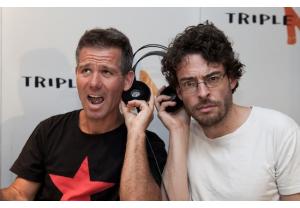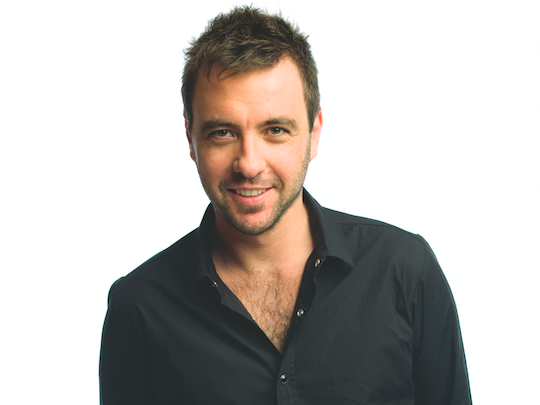Mike Fitzpatrick chats with Peter Saxon
Triple M’s Group Content Director Mike Fitzpatrick has recently returned from Radio Days in Ireland where he gave a presentation to an international audience of broadcasters entitled Back From the Dead. He’s been widely credited with the resurgence of the Triple M brand after it had hit rock bottom about six years ago.
But Fitzpatrick, Fitzy to his mates and just about anyone else who knows him, deflects any suggestion that he is the sole architect of Triple M’s resurrection. “There are many people involved from Guy Dobson and Craig Bruce (below left) and to our on air talent, content teams and marketing. It would be silly to think it’s one person,” he says.
During our chat, Fitzy takes us on the Triple M rollercoaster ride and explains why the brand was derailed and how it was rebuilt on a foundation of Rock.
 radioinfo: Back from the Dead? When did it die?
radioinfo: Back from the Dead? When did it die?
Fitzy: It was never dead. It’s heart was still beating… just with a three share.
radioinfo With the ghosts of Triple M legends past: Doug Mulray, Andrew Denton, Club Veg, The Shebang, to mention a few, still haunting the station, you anchored The Cage in Melbourne – which went for seven years. What brought that to an end?
All the people who had signed up for what Triple M stands for which is Rock Music, we stepped away from.
Fitzy: Like music, like charts, like a lot of things in life and media, there are cycles. It’s silly to put an exact time limit on it, but in my experience seven to eight years is the life cycle of a show.
The end for the Cage came (in 2007) when James Brayshaw stepped off. He was such an important nucleus of that show that the decision was made to disband and start again from scratch.
At that time I was just a performer on the breakfast show. I didn’t step back into programming till Shaun Gough was put in as Content Director in 2008.
radioinfo: Then you put Pete Helliar and Myf Warhurst in breakfast. Was that show the beginning of the end?
Fitzy: Yes. The show wasn’t connecting. We adjusted the music to try and chase an audience that we thought would be attracted to Pete and Myf and basically stepped away for our core audience.
All the people who had signed up for what Triple M stands for which is Rock Music, we stepped away from.
So when you’re playing Gabriella Cilmi and Katie Perry and the Rogue Traders next to Cold Chisel and Def Leppard… I don’t know who wants to hear that. We thought we could keep a certain amount of our core listeners and attract new ones. And that was probably the end.
radioinfo: You’ve hit rock bottom. At that point, what do you do?
Fitzy: You go back and look at what the brand’s famous for and you look at where the audience is and why that audience you want is not being served. Our audience was still there, but we’d kind of stepped away from being a rock station. Nobody had stepped into our space and said, ‘we’ll be the Rock station.’ So, the audience had become disenfranchised and they were kind of listening everywhere.
radioinfo: Whose idea was it to reinvent the traditional Triple M format?
Fitzy: When Eddie McGuire comes in and goes, “I love Triple M. I love this brand and I want people to be proud of it again and I want to do breakfast and here’s what I think is missing,” something in your brain goes, Yeah…right! I don’t think it’s any one person’s idea. It’s a combination of people.
radioinfo: As they say, success has many fathers…
We found that men in Melbourne were switching to SEN to get their sport fix.
Fitzy: Traditionally Triple M had always had success with a Rock, Sport and Comedy format that Jeff Allis, Guy and Brad had established years before with a big breakfast comedy show, a big drive comedy show and football just on the weekends.
radioinfo: Walk us through the rebuild.
Fitzy: In re-establishing Triple M we thought, what if we extended the idea of football through the DNA of the radio station because we found that men in Melbourne were switching to SEN to get their sport fix. And we thought why should they have any reason to switch us off? So, let’s create a radio station that if a sports story breaks, they don’t have to switch away to SEN, they get it here. So we started breaking into songs to deliver breaking sports news. We’d go live to press conferences.
If we were creating a new breakfast show, why would we want to do just another version of what Matt and Jo were doing or what Hughesy and Kate were doing or what Grubby and Dee Dee were doing? Because they were doing it very well. We’d just be them – but a light, low calorie version.
You’re never going to win a content war or a marketing war if you’re doing the same thing, even if you’re better.
radioinfo: But the concept doesn’t work as well in Sydney. Are you disappointed in that?
Fitzy: What do you mean the concept doesn’t work in Sydney?!!
radioinfo: I mean it doesn’t rate as highly.
Our KPIs for this station is that it wins men. And it wins men hands down.
 Fitzy: It’s a completely different show! And a different city where you don’t have a ubiquitous football code. It’s a religion (in Melbourne). You go to any game on the weekend and half the people in the crowd are female and there are kids there. And on any given day the biggest story in town is a football story. That’s why the Hot Breakfast (left (L-R) Luke Darcy, Eddie McGuire and Mick Molloy)
Fitzy: It’s a completely different show! And a different city where you don’t have a ubiquitous football code. It’s a religion (in Melbourne). You go to any game on the weekend and half the people in the crowd are female and there are kids there. And on any given day the biggest story in town is a football story. That’s why the Hot Breakfast (left (L-R) Luke Darcy, Eddie McGuire and Mick Molloy)
Sydney’s Grill Team is a different show. It’s a male show, it has sport in it’s DNA but there’s very little sport in that show. It’s got sports guys on it, but not a lot of sports in the show.
radioinfo: But that’s my point, because Sydney is a different city, it will not be as successful as Melbourne with a sports format.
Fitzy: It’s not a sports format, Peter! It’s a rock, sport and comedy format. Sport is in our DNA. But it’s not a sports breakfast show. They don’t talk that much about sport.
In any case, it depends what you judge success on.
Our KPIs for this station is that it wins men. And it wins men hands down. If you’re judging it on a 10+ perspective, well then you would look at that and go, wow that’s not a very successful radio station.
But success is also about revenue and it’s hugely successful from a revenue point of view. We’ve created environments throughout the whole network that clients can be integrated into – and successful environments where the clients become stars and I think that that’s as important to note as success for Triple M as the ratings.
radioinfo: Nonetheless, with all the turmoil and changes at other networks, did you expect better survey results for Triple M?
For the first 18 months all they told me was how much they didn’t like Eddie McGuire because he was seen as divisive.
Fitzy: There’s phenomenal amounts of money being spent on marketing (by other stations).
radioinfo: And you’re not seeing much spent on Triple M?
Fitzy: We’re a unique proposition. Who’s competing against us? Why market to people already listening to us? Remember Eddie got to number one without a lot of marketing.
radioinfo: What part did research play in hiring Eddie to do breakfast?
Fitzy: Research is just another tool, like asking questions of other people. I’d never rely wholly and solely on research. If I had, the Hot Breakfast would not be on air right now because for the first 18 months all they told me was how much they didn’t like Eddie McGuire because he was seen as divisive. I cannot find a bad comment about Eddie now.
radioinfo: Do you miss being on air?
 Fitzy: I miss the fun and camaraderie of being on air. I would love to jump in with Matt and Joe (left) in the afternoon. I hear Mez (Merrick Watts) and the guys on 2Day or Marty and Tim on Nova and I think god I want to jump in.
Fitzy: I miss the fun and camaraderie of being on air. I would love to jump in with Matt and Joe (left) in the afternoon. I hear Mez (Merrick Watts) and the guys on 2Day or Marty and Tim on Nova and I think god I want to jump in.
I think in the back of every program director’s mind they you go: When I get the tap on the shoulder and they say, ‘alright you’ve done your bit” you’d go: can I go back and do breakfast now please?
If there’s one thing I know I’m not an imposter at its being on air.
radioinfo: A lot of things have changed since you were on air in Bathurst…
Fitzy: What hasn’t changed is that radio engages and offer companionship and insights that you cant get in 144 characters on Twitter. It can be hyper-local which a lot of those streaming websites are not. Our opportunity is not to ignore the social aspect of localism.
If I hear one more person say radio is the original social media I’m going to scream because what radio needs to do is not think about how radio used to be but to look to how good we still are and what our opportunities are with other media channels.
The thing that amazes me is that there is still talent in this country that refuse to get on social media.
radioinfo: Where does social media fit in?
Fitzy: Social media is just another channel. Our breakfast show is live on FM – in the car and streaming on line and on digital radio for three hours a day. But for 21 hours a day they have other live channels like instagram, facebook and Twitter.
The thing that amazes me is that there is still talent in this country that refuse to get on social media. It’s a microphone. And the analogy I use is that in 1956 there was a whole heap of radio people offered jobs in television and many of them go ‘Pffft… sorry, I’m not doing that . I’m a radio person’. Do you know who those people were?
radioinfo: No, who?
Fitzy: No one knows because they didn’t go to fucking television. But Graham Kennedy did and Bert Newton did and Ernie Sigley did. All those radio guys who took the opportunity to embrace the new media and still do radio are the ones that continued to have strong careers. Radio people now who don’t embrace social media will get left behind. I can’t even believe we are still having this conversation in 2014.
In the final part of our chat with Mike Fitzpatrick, coming soon, he talks about the part that Rock Music played in the rebirth of Triple M.

Peter Saxon

